Browse
AAP announces 8 new PIRA partnership awards
Alliance for African Partnership (AAP), a consortium of ten leading African universities, Michigan State University (MSU), and a network of African research institutes, is excited to announce the recipients of the 2024 Partnerships for Innovative Research in Africa (PIRA) seed funding. Each team is composed of at least one lead from an AAP African member institution and one MSU lead. Some teams also include additional partners from NGOs and/or other universities from outside of AAP’s consortium. A consortium-wide initiative, PIRA grants are a tiered funding opportunity designed to cultivate and support multidirectional and transregional research partnerships at any stage of their development, whether it be initiatives to explore and create new relationships or scale existing ones. The total amount of PIRA grants awarded in 2024 is over $500,000.
Awarded projects cover diverse disciplinary perspectives and span AAP’s seven priority areas:
Agri-food systems
Water, Energy and Environment
Culture and Society
Youth Empowerment
Education
Health and Nutrition
Science, Technology and Innovation
All projects will integrate gender, equityand and inclusion issues in all stages of the project.
This year’s winning projects include:
Towards the Implementation of Smart Villages in the Rural Communities of Taraba State in Nigeria
Research leads: Shanelle N. Foster (MSU), Chidimma Frances Igboeli (University of Nigeria, Nsukka), Mbika Mutega (University of Johannesburg), Sari Stark (University of Lapland)
Institutional partners: Michigan State University (College of Engineering), University of Nigeria, Nsukka, University of Johannesburg and University of Lapland
Funding tier: Scaling grant (up to $100,000)
Green Technology Extraction and Characterization of Bioactive Components from Edible Fruits of Vitex donania and Uvaria chamae
Research leads: Leslie D. Bourquin (MSU), Insa Seck (UCAD)
Institutional partners: Michigan State University (College of Agriculture & Natural Resources), Universite Cheikh Anta Diop
Funding tier: Planning grant (up to $50,000)
Qi Hua Fan of MSU (left) and Tabitha Amollo of Egerton University (right) working in their solar cell lab.
Develop a Partnership for Renewable Energy Research and Education
Research leads: Qi Hua Fan (MSU), Tabitha Amollo (Egerton)
Institutional partners: Michigan State University (College of Engineering), Egerton University
Funding tier: Scaling grant (up to $100,000)
Bridging the Gap: Strengthening Research, Management and Community Alliances in South Africa’s Largest Coastal Marine Protected Area
Research leads: Amber K. Peters (MSU), Els Vermeulen (UP), Grant Smith (Sharklife)
Institutional partners: Michigan State University (College of Agriculture and Natural Resources), University of Pretoria, Sharklife Conservation Group
Funding tier: Planning grant (up to $50,000)
Changing Public Attitudes and Behaviors of Buying Counterfeits through Evidence-Based Education and Awareness-Raising Campaigns in Kenya
Research leads: Saleem Alhabash (MSU), Maureen Kangu (USIU), Robi Koki Ochieng (USIU), John Akoten (Anti-Counterfeit Authority)
Institutional partners: Michigan State University (College of Communication Arts & Sciences), United States International University-Africa, Anti-Counterfeit Authority
Funding tier: Planning grant (up to $50,000)
Leveraging Tourism and Hospitality Ecosystems to Expand Youth Entrepreneurship and Empowerment in Botswana
Research leads: Karthik Namasivayam (MSU), Mokgogi Lenao (UB)
Institutional partners: Michigan State University (Broad College of Business), University of Botswana
Funding tier: Planning grant (up to $50,000)
Children attending Pre-school in Tanzania benefit from the research project of Bethany Wilinski of MSU and Subilaga M Kejo of University of Dar es Salaam.
Tucheze Pamoja: Co-Creating Feasible and Sustainable Play-based Learning Approaches in Tanzania
Research leads: Bethany Wilinski (MSU), Subilaga M Kejo (UDSM)
Institutional partners: Michigan State University (College of Education), University of Dar es Salaam
Funding tier: Scaling grant (up to $100,000)
Promoting Science Communication and Engagement through Training and Digital Media Platforms
Research leads: Susan McFarlane-Alvarez (MSU), Dikabo Mogopodi (UB)
Institutional partners: Michigan State University (College of Communication Arts and Sciences), University of Botswana
Funding tier: Planning grant (up to $50,000)
“We were extremely impressed with the quality and diversity of proposals we received for this cycle of the PIRA program. The projects that were awarded all embody AAP’s commitment to innovation, equitable partnership, and our shared vision of transforming lives in Africa and beyond,” said Amy Jamison, co-director of the Alliance for African Partnership.
A unique aspect of PIRA grants is the expectation that institutions will establish and develop equitable partnerships from conception to close out of their respective projects. These equitable partnerships will be among the research team members themselves and include relevant local stakeholders. Teams will involve these local stakeholders as appropriate throughout the project, respecting their knowledge and expertise, and taking an adaptive approach that is responsive to the local context.
We invite you to join our virtual PIRA launch and showcase event at 8 a.m., Tuesday, Feb. 25 when all of our awardees will be discussing their projects. You can register for the event on Zoom.For more information, visit the Alliance for African Partnership website.
By:
Justin Rabineau
Monday, Jan 27, 2025
AGRI-FOOD SYSTEMS
+6
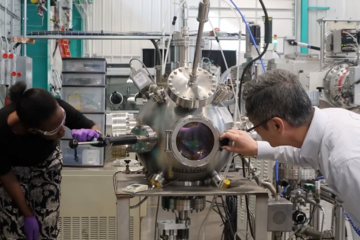
Leave a comment
Multidimensional impact of environmental change in the African Great Lakes
Recorded on March 24th, 2023 as part of AAP Public Dialogue Series
By:
Justin Rabineau
Monday, Jan 27, 2025
WATER, ENERGY, AND THE ENVIRONMENT
Leave a comment
Leveraging Demand Driven Research for Evidence Based Policymaking and Program Development
Recorded on June 2nd, 2023
By:
Justin Rabineau
Monday, Jan 27, 2025
CULTURE AND SOCIETY
Leave a comment
Harnessing Africa's Bounty: Promoting Indigenous and Traditional Crops for Sustainable Food Systems
Recording on May 15th, 2024 as part of AAP Public Dialogue Series
By:
Justin Rabineau
Monday, Jan 27, 2025
AGRI-FOOD SYSTEMS
Leave a comment
Harnessing Artificial Intelligence for Transformative Education in Africa
Recorded on Nov 20th, 2024 as part of AAP Public Dialogue Series
By:
Justin Rabineau
Monday, Jan 27, 2025
SCIENCE, TECHNOLOGY AND INNOVATION
Leave a comment
CALL FOR PAPERS, JOURNAL OF WEST AFRICAN HISTORY
CALL FOR PAPERS, JOURNAL OF WEST AFRICAN HISTORY
Journal of West African History•01/09/2025Announcement
Location
Michigan, United States
Subject Fields
African History / Studies
CALL FOR PAPERS, JOURNAL OF WEST AFRICAN HISTORY
Founding Editor-in-Chief: Nwando AchebeEditors: Saheed Aderinto, Trevor R. Getz, Toby Green, Vincent Hiribarren, Harry Nii Koney Odamtten. Book Review Editors: Mark Deets, Nana Kesse, Madina Thiam.
The Journal of West African History (JWAH) is a peer-reviewed, interdisciplinary research journal dedicated to publishing high-quality scholarship on West African history. Positioned at the forefront of new research, JWAH addresses representation gaps by fostering critical scholarship on topics such as women and gender, sexuality, slavery, oral history, popular and public culture, and religion. The editorial board invites submissions that engage diverse topical, theoretical, and methodological approaches. Committed to rigorous analysis and international in scope, JWAH offers a critical intervention in knowledge production. Each issue includes scholarly book reviews, and articles are published in English, French, and Portuguese, with African-language abstracts. JWAH is published by Michigan State University Press.
The editorial board invites scholars to submit original article-length manuscripts (not exceeding 10,000 words including endnotes) accompanied by an abstract that summarizes the argument and significance of the work. Review essays should engage the interpretation, meaning, or importance of an author’s argument for a wider scholarly audience. See what we have available for review on our Book Reviews page. Please contact our Book Review Editors at mark.deets@aucegypt.edu, madina.thiam@nyu.edu, or nkesse@clarku.edu for more information.
Manuscripts submitted to the Journal of West African History should be submitted online at https://ojs.msupress.org/index.php/JWAH/submission/wizard. In order to submit an article, you will have to create an account. The site will guide you through this process.
Contact Email
jwah@msu.edu
By:
Baboki Gaolaolwe-Major
Wednesday, Jan 15, 2025
CULTURE AND SOCIETY
No Preview Available
Leave a comment
Announcing Journal of West African History, Volume 10, Issue 1
Journal of West African History
Announcement Type
Journal
Location
MI, United States
Announcing Journal of West African History, Volume 10, Issue 1
Founding Editor-in-Chief: Nwando AchebeAssociate Editors: Saheed Aderinto, Trevor R. Getz, Toby Green, Vincent Hiribarren, Harry Nii Koney Odamtten. Book Review Editors: Mark Deets, Madina Thiam, Nana Kesse.
Volume 10, Issue I, NOW AVAILABLE!
The Journal of West African History (JWAH) is an interdisciplinary peer-reviewed research journal that publishes the highest quality articles on West African history. Located at the cutting edge of new scholarship on the social, cultural, economic, and political history of West Africa, JWAH fills a representational gap by providing a forum for serious scholarship and debate on women and gender, sexuality, slavery, oral history, popular and public culture, and religion. The editorial board encourages authors to explore a wide range of topical, theoretical, methodological, and empirical perspectives in new and exciting ways. The journal is committed to rigorous thinking and analysis; is international in scope; and offers a critical intervention about knowledge production. Scholarly reviews of current books in the field appear in every issue. JWAH publishes primarily in English but recently published its first French issue. JWAH also plans to publish articles in Portuguese and is experimenting with African-language abstracts in forthcoming issues. JWAH is published by Michigan State University Press.
Editor's Introduction
Nwando Achebe, “Amaechina”
Articles
Cassandra Mark-Thiesen, “Progressive Empire?: Liberian Agriculture, Black American Farming Experts and World War II Engaging Africa and the World”
Emmanuel Asiedu-Acquah, “Engaging Africa and the World”
Caroline Maguire, “Artification and Decolonization at the Musée d’Art Africain de l’IFAN, Dakar”
Sarah Zimmerman, “Legacies of French Colonial Militarization and Gender-Based Violence in the Sahel”
Riina Turtio, “Soviet Military Assistance to Mali and Guinea, 1958-1980”
Book Reviews
Transcripts of the Sacred in Nigeria: Beautiful, Monstrous, Ridiculous (by Nimi Wariboko), Reviewed by Tara Hollies.
State-building and National Militaries in Postcolonial West Africa: Decolonizing the Means of Coercion 1958–1974 (by Riina Turtio), Reviewed by Joe Gazeley.
Letters, Kinship, and Social Mobility in Nigeria (by Olufemi Vaughan), Reviewed by Lisa Lindsay.
Mieux vaut tard que jamais: Sur les traces de six tirailleurs guinéens fusillés à Clamecy en juin 1940 (by Daniel Couriol), Reviewed by Madia Thomson.
Decolonizing Independence: Statecraft in Nigeria's First Republic and Israeli Interventions (by Lynn Schler), reviewed by Rouven Kunstmann.
Submissions
The editorial board invites scholars to submit original article-length manuscripts (not exceeding 10,000 words including endnotes) accompanied by an abstract that summarizes the argument and significance of the work. Review essays should engage the interpretation, meaning, or importance of an author’s argument for a wider scholarly audience. Please contact our Book Review Editors at mark.deets@aucegypt.edu, madina.thiam@nyu.edu, or nkesse@clarku.edu for more information.
Contact Email:jwah@msu.edu
By:
Baboki Gaolaolwe-Major
Wednesday, Jan 15, 2025
CULTURE AND SOCIETY
+1
No Preview Available
Leave a comment
Tackling Urban Challenges in Freetown
With over 1 million residents, Freetown, Sierra Leone’s capital, faces critical challenges in housing, infrastructure, and service provision—issues intensified by climate change. Many residents live in informal settlements; up to 70% of the population works in the informal sector.
In response, the Sierra Leone Urban Research Centre (SLURC) was established in 2015 to address these pressing issues through research, capacity building, and advocacy, focusing on health, land, housing, and mobility. SLURC has become a vital platform for dialogue, bringing together urban stakeholders to shape Freetown’s future.
Urban Transformations in Sierra Leone captures SLURC’s impactful journey, showcasing key findings from diverse research projects and highlighting the power of transdisciplinary collaboration.
Discover how knowledge and partnerships are reshaping Freetown.Download the book for free: https://ow.ly/AivJ50UlstO
By:
Baboki Gaolaolwe-Major
Saturday, Dec 7, 2024
CULTURE AND SOCIETY
+1
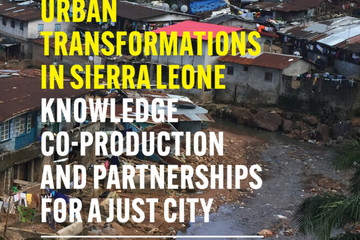
Leave a comment
Advancing African Entrepreneurship Through Research and Mentorship- Anastasia Mamanbulo
Anastasia Mamabolo, Associate Professor at the Gordon Institute of Business Science (GIBS) and at the University of Pretoria, is a visionary leader in entrepreneurship. Her work is shaping how entrepreneurship is taught and highlighting the critical role of research and mentorship in driving economic growth across Africa.
Anastasia's research identifies the essential skills entrepreneurs need at different stages of their ventures. “My research looks at the skills entrepreneurs require when they start their businesses and how these skills evolve as the businesses grow,” she shared. Her work has resulted in a comprehensive framework that training institutions can use to measure and develop entrepreneurial skills, ensuring tailored support for aspiring business owners.
One of her proudest achievements is the publication of a paper on the role of religion in entrepreneurship, which was recognized as the Best Paper for 2022 by the Journal of World Business. “This recognition is a testament to the relevance of understanding not just the economic but also the cultural and spiritual dimensions of entrepreneurship in Africa,” she said.
In addition to her research, Anastasia was recently appointed the APSA Chair of Entrepreneurship at GIBS, a role that will enable her to lead several initiatives, including a school incubation program for entrepreneurial training and the development of an African Entrepreneurship Index. “This index will measure the competencies of entrepreneurs across Africa, helping us build a credible database that researchers and practitioners can use to improve entrepreneurial development,” she explained.
AAP’s Role in Her Journey
Anastasia’s journey as a researcher has been significantly shaped by the Alliance for African Partnership (AAP). Introduced to AAP by her former dean, Professor Nicola Klein, Anastasia participated in the African Futures Research Leadership Program, which provided her with the opportunity to focus on her research, gain mentorship, and collaborate with international scholars.
“The mentorship I received through AAP was invaluable,” Anastasia emphasized. Under the guidance of Professor Jerry McNamara, a leading strategy scholar, she learned how to conduct high-quality research that resonates with both African and global audiences. “AAP helped me build my confidence as a scholar, gave me an academic voice, and equipped me to bridge the gap between research and practice,” she added.
The Future: Strengthening African Entrepreneurship
Looking to the future, Anastasia envisions becoming a thought leader in African entrepreneurship research. “We don’t have enough research on the incredible entrepreneurial activities happening across the continent,” she said. “My goal is to strengthen the voice of African researchers in this field and foster collaborations that will advance entrepreneurship.”
She also plans to focus on bridging the gap between academia and practice by supporting students in their research efforts, developing actionable insights for entrepreneurs, and continuing her work through the APSA Chair to promote financial inclusion and access to resources for African entrepreneurs.
Advice for Early Career Researchers
Reflecting on her journey, Anastasia emphasized the importance of mentorship and the integration of research into academic work. “Mentorship is crucial for early-career researchers. I was fortunate to have a mentor who guided me through academia, helping me position myself as a research-focused academic,” she noted.
Her advice to young scholars? “Don't neglect your research. Incorporate it into your teaching, and don’t be afraid to seek mentorship—even from those outside your field. It’s through collaboration and consistent research efforts that you’ll grow and make meaningful contributions.”
Anastasia’s work exemplifies the impact of research, mentorship, and dedication to advancing entrepreneurship in Africa. With her leadership, the future of African entrepreneurship looks promising and filled with potential for growth and innovation.
By:
Baboki Gaolaolwe-Major
Tuesday, Nov 12, 2024
EDUCATION
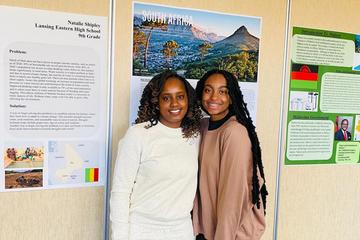
Leave a comment
Empowering Change through Research – An Interview with Dr. Binta Kuita
At the forefront of academic leadership and research in Mali, Dr. Binta Kuita, an Associate Professor of Applied Linguistics at the University of Letters and Humanities of Bamako, has made significant strides in inclusion, diversity, and disability advocacy. As an African Future Fellow for the Alliance for the African Partnership (AAP) from 2021-2022, Dr. Kuita’s journey reflects resilience, empowerment, and commitment to driving change in her community and beyond.
Dr. Kuita’s research has evolved from her PhD work in Applied Linguistics, which focused on the cultural impacts of learning English as a foreign language, to a broader spectrum of social issues. Today, her work encompasses language education, diversity, and inclusion, particularly advocating for the rights of people with disabilities in Mali. This transformative shift in her research aligns with her appointment as Associate Professor at the University of Letters and Humanities of Bamako and her continuous collaboration with leading academic mentors.
“I've recently focused on diversifying my research, especially towards inclusion and equity for women and people with disabilities,” Dr. Kuita shared, highlighting her pivotal research project on the inclusion of people with disabilities, carried out under the mentorship of Professors Pony Tsang from Michigan State University (MSU) and Idrissa Soeba Traore from her home institution in Mali.
The Role of AAP in Career Growth
As an African Future Fellow, Dr. Kuita credits AAP with providing the platform and support to accelerate her academic career. “AAP has uplifted me not just as a researcher, but as a leader,” she explained. The fellowship provided her with the resources and mentorship to overcome societal and cultural barriers, enabling her to concentrate on her research and career growth.
Workshops and networking opportunities through AAP and MSU have been particularly influential in building her academic and leadership capacities. “These workshops, often led by women in academia, were inspiring because their stories were very similar to mine,” she said. The collaborative bonds formed through these experiences continue to bolster her professional development, aiding in manuscript production, grant writing, and conference participation.
Her Vision for the Future
Dr. Kuita’s vision for the future is filled with promise, not only for herself but for those she impacts through her work. “I want to continue to open doors for young researchers,” she expressed, underlining her commitment to mentoring junior academics. One of her current initiatives is the establishment of a disability and inclusive unit at her university, aimed at creating a supportive environment for students with disabilities. This project is innovative in Mali, and Dr. Kuita hopes it will be replicated across other institutions in the country.
In addition to her academic goals, she is also committed to nurturing the next generation of scholars through mentorship programs that foster collaboration between African researchers and international academic communities, particularly through her strong ties with AAP and MSU.
Words of Advice
For young researchers, Dr. Kuita has one clear message: “Believe in your dreams and hold on to your goals.” She encourages aspiring academics to build robust, collaborative networks and take advantage of opportunities like the AAP African Future program, which she describes as “life changing.”
Dr. Kuita’s journey is a testament to the power of resilience, mentorship, and the transformative potential of research. As she continues to pave the way for others, her work stands as a beacon of hope for women, people with disabilities, and young researchers striving to make a difference.
By:
Baboki Gaolaolwe-Major
Tuesday, Nov 12, 2024
EDUCATION

Leave a comment
A Journey of Academic Excellence through Community Engagement
Translating scientific knowledge for societal benefit has long posed a challenge in research. Until about two decades ago, this crucial aspect of science received limited emphasis. However, community engagement—often referred to as public engagement or science communication—has now become a critical component that facilitates the application of research by end users. The scientific community has increasingly recognized that research is incomplete without involving key stakeholders and end users, necessitating a human-centric approach to research and development.
Dr. Mercy Kaburu, an accomplished Assistant Professor of International Relations at Kenya’s United States International University (USIU), exemplifies this approach. She is dedicated to using community engagement to effectively translate research on Kenya’s foreign policy, its role in regional and global politics, regional integration within the East African Community (EAC), and women’s political participation, especially in Kenya.
As an emerging leader in science and her community, Dr. Kaburu has achieved notable successes, has led impactful research initiatives, and has engaged with her community in ways that underscore her impressive academic journey. Her research focuses on three core areas: Kenya’s foreign policy, regional integration within the EAC, and enhancing women’s political participation in Kenya. Over the last three years, she has published articles on key topics such as Kenya's elections, gender-based violence, and regional integration. One of her most notable achievements was securing a prestigious publication in the Washington Post on regional integration within the EAC, along with a forthcoming book chapter on Kenya's foreign policy.
In addition to her publications, Dr. Kaburu is leading a joint research initiative between USIU, the University of Nairobi, and the Free Pentecostal Fellowship in Kenya. This five-year project, which focuses on child protection in Busia County, highlights her dedication to community engagement and research that has a real-world impact. "This project will allow me to make a difference, especially on issues relating to policy and child protection," she explains with enthusiasm.
AAP’s Role in Her Journey
After participating in the Alliance for African Partnership (AAP) program at Michigan State University (MSU), Dr. Kaburu was promoted to Assistant Professor. Reflecting on the impact of AAP, she says, “One of the biggest things AAP did for me was open my spaces for conferencing and partnership, attending academic conferences, and creating new collaborations.”
Her time at MSU, supported by AAP, broadened her academic horizons through conference presentations and the establishment of crucial partnerships. Dr. Kaburu expressed her gratitude for the mentorship she received, particularly from Professor Caroline Logan, who played an instrumental role in guiding her conference participation and subsequent publications. “Thanks to my mentor, I was able to attend key conferences, which played a major role in helping me meet the guidelines for promotion,” she adds.
Looking Ahead
Dr. Kaburu’s future shines brightly as she continues to expand her academic and community-based endeavors. Recently appointed by Afrobarometer as the Coordinator for Capacity Building for Early Career Scholars in Africa, Dr. Kaburu is excited about furthering her research and mentoring new scholars. “I am looking at myself engaging more with the community,” she shares. “I believe I can have my fingerprint on policy, especially regarding women and political participation in Kenya.”
Her current focus includes securing more research grants and influencing policy. Looking ahead, she aspires to become an Associate Professor within the next three years. “I am giving myself the next three years to meet the requirements of an Associate Professor. Growth, for me, is very important,” she says confidently.
Dr. Kaburu’s inspiring story serves as a testament to the transformative power of opportunities like the AAP program. Her advice to other scholars, particularly women, is to seize opportunities for growth and mentorship. “When a woman scholar gets the opportunity, please take it up, and always try to build lasting relationships with your mentor,” she advises.
As she continues to make strides in her career and community involvement, we look forward to seeing the incredible impact she will undoubtedly continue to make.
By:
Baboki Gaolaolwe-Major
Tuesday, Nov 12, 2024
EDUCATION
+1
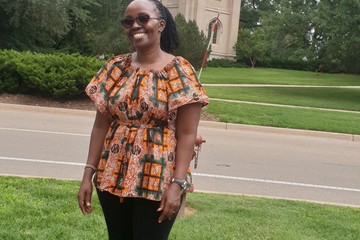
Leave a comment
Makerere University is determined to end Sickle Cell Disorder in Africa, in the lead of this mission
As you’re reading this sentence someone lost the opportunity of a lifetime simply because they are a woman. And as you’re reading this sentence, someone else was denied their dream for the exact same reason. Worldwide the proverbial glass ceiling has been cracked and battered over the past century. For most of us, we live in a world where women can vote, have aspirations, and are considered equal human beings instead of someone’s property. But damaged as the glass ceiling may be, it still hangs over the heads of many women. If you find this hard to believe, just ask any woman you know, and they will tell you how hard they had to fight for the same thing others take for granted. So, how can a woman become a leader in a world dominated by men?
The Alliance for African Partnership (AAP) recently launched a Centre of Excellence for Sickle Cell Anemia and Other Neglected Tropical Diseases during their annual consortium meeting at Makerere University (MAK). Nothing fell short of a tag “impressive”. Sarah Kiguli, a MAK scholar based in Uganda, has not only consistently been a leader amongst the academic and medical academic community, but she has been on the forefront of decisions affecting the country’s future. She sat on the council for Makerere University for eight years, she served as the president of the Association of Uganda Women Medical Doctors for four years and most recently, she has founded the Centre of Excellence for Sickle Cell Anemia and Other Neglected Tropical Diseases and spear heading this noble idea.
The center promises to be a turning point for Uganda, doing research on how to combat diseases which have been plaguing Uganda unabetted for years. Despite the center only existing for a month, it has already set up a system to register patients with sickle cell disease. By registering them, they and others will be aware of the risks of passing this disease down to the next generation and can take the necessary steps to prevent that.
Sarah’s resume of consistence excellence in leadership is a testament to her determination, but as with every woman before her she needed to scratch and claw at the glass ceiling to reach where she is today. Thanks to the leadership of Vice Chancellor, Prof Barnabas Nawangwe of recognizing these challenges, Sarah finds herself at the helm of this noble institution. When asked about the challenges she and other Ugandan woman have faced, she spoke about the difficulty of gaining the necessary skills to lead while raising a family. Worldwide, the common perception is that the women raise the family, and the men earn the money. Even if a woman is doing her best to earn, she is expected to shoulder the burden of cooking, cleaning, tending to the children. Can you imagine earning a bachelor’s degree, two master’s degrees and fellowship while having to juggle being a mother? Many people don’t need to imagine, and still, like Sarah, they manage to thrive. Even with less sleep, even with more stress, they succeed.
But despite her climb through the ceiling, Sarah is humble. Her story is not known because she does not go out of her way to share it. Partially due to introversion, Sarah does not make the obstacles she has broken through evident to those around her. Instead, she uses her passion to inspire. Using Vice Chancellor Nawangwe as an example, she explained that her passion for helping Ugandans suffering from diseases such as anemia is often enough to persuade him to trust in her ideas. This wouldn’t be the only time her passion for helping others aided her in her journey. She would note that she didn’t ascend the ladder to leadership alone. While her world is indeed dominated by men, many of them were swayed by her care for others and her willingness to do whatever is needed as she went through training in medical school as well as through her service in pediatrics. They mentored and supported her on her path to leadership, and she feels that without them she would not be where she is today.
She pays this forward to women that she works with. As she keeps an eye out for women to add to her team or to mentor into becoming leaders of their own. According to Sarah, she doesn’t just do this out of the kindness of her heart though, she knows and understands that women are necessary for science to continue to surge forward. When asked on the perspectives that women bring to science she used her experiences in Uganda as an example. In her culture, she noted that most women think broadly, beyond science, but the social and psychosocial effects of what they are studying and how to best mobilize communities to put solutions into effect. When looking at sickle cell research itself, she noted that the nurturing perspectives of older women allows for better research and mobilization teams to be built as well as patient care to be improved.
Finally, when Sarah Kiguli was asked to give advice to women who want to become leaders, or women who have been inspired by her story, she had the following to say: Think that woman should believe in herself. Believe in yourself, set your goals so that you can know where you want to go. Make targets, work with other people, work with people who support you. It is lonely, it is a lonely path moving up there, but also being up there is extremely lonely, especially if you are successful. It is lonely. So, surround yourself with people who support you. And we should always look out for each other as women. I know that there are groups holding researchers i know for doctors, we have groups holding doctors. But find, find, find a mentor if you don't have a mentor. mentorship is really important and find men and women who are willing to look out for you. So that they support you as you go through this journey. And it is actually possible. It is possible!
If you want to go there, identify what your niche is, what you want to do.
And then start the journey.
By:
Baboki Gaolaolwe-Major
Tuesday, Nov 12, 2024
HEALTH AND NUTRITION
+1
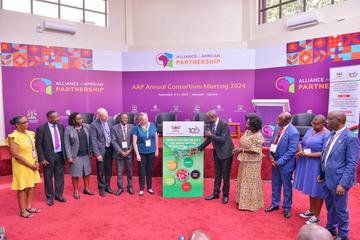

Leave a comment